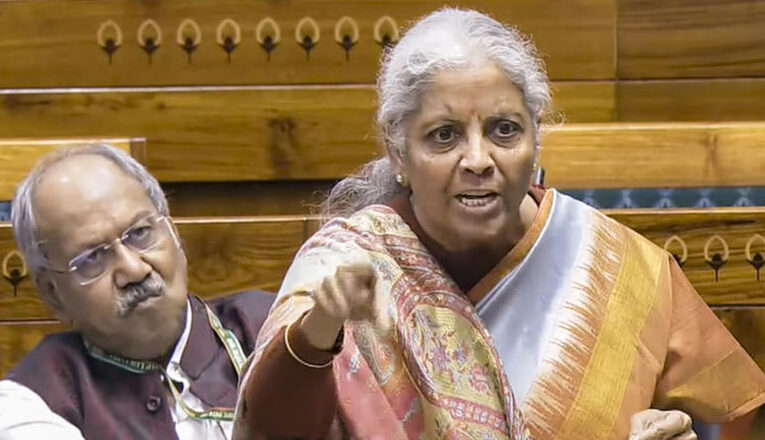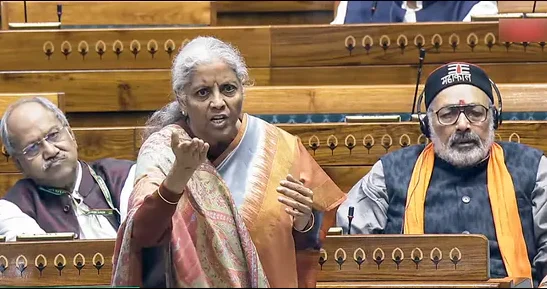Language Debate in Lok Sabha: Sitharaman and DMK Clash Over Hindi in Tamil Nadu
A heated exchange over language erupted in the Lok Sabha on Tuesday, bringing to the forefront the long-standing debate over linguistic identity and imposition in India. Finance Minister Nirmala Sitharaman ignited the discussion by recounting personal experiences of facing ridicule for learning Hindi during her school years in Tamil Nadu. The comments sparked strong reactions, especially from the Dravida Munnetra Kazhagam (DMK), highlighting the sensitivity surrounding linguistic diversity in India.
Also Read: Auto Accident Attorney Jacksonville FL: Your Guide to Legal Representation
Sitharaman’s Recollection of Mockery
Recalling her childhood in Tamil Nadu, Sitharaman said she faced criticism for pursuing Hindi, which is often associated with North India. She shared, “I was mocked for wanting to learn Hindi in Tamil Nadu. People questioned why I, living in Tamil Nadu, would want to learn a language they perceived as belonging to North India. Those comments still resonate in my mind.”
She further elaborated that learning Hindi and Sanskrit in Tamil Nadu was often equated to embracing foreign languages. “Is Tamil Nadu not part of India? What is wrong in learning Hindi?” she asked. According to Sitharaman, such attitudes hindered her fundamental right to learn a language of her choice.
The minister also revealed that she was labeled as a vandheri, a Tamil term meaning outsider, for her decision to study Hindi. “It’s fine to oppose the imposition of Hindi, but why impose restrictions on those wanting to learn it?” she questioned, accusing the state of fostering a culture where certain Indian languages were viewed as foreign.
DMK’s Strong Response
Sitharaman’s remarks were met with a sharp rebuttal from the DMK. Thoothukudi MP Kanimozhi refuted the allegations, stating, “It has never been the case that anybody was stopped from learning any language in Tamil Nadu. We oppose the imposition of Hindi, not the learning of it.”
Kanimozhi emphasized that Tamil Nadu has always stood against the forced imposition of Hindi while maintaining a liberal stance on individual language preferences. She added, “The narrative that Tamil Nadu discourages Hindi learners is not accurate. Our fight has always been against the central imposition of Hindi, which threatens linguistic diversity.”
The BJP’s Stance on Regional Languages
Amid the debate, Sitharaman defended the Bharatiya Janata Party’s (BJP) position on promoting regional languages. She cited Prime Minister Narendra Modi’s efforts to highlight Tamil on global platforms, including the United Nations, as an example of the party’s respect for India’s linguistic diversity. “Under PM Modi’s leadership, Tamil has received unprecedented recognition internationally. This demonstrates our commitment to preserving and promoting all regional languages,” she said.
A Historical Context to the Language Debate
The debate over language in Tamil Nadu is not new. Historically, the state has been at the forefront of opposing Hindi imposition, with the anti-Hindi agitation of the 1960s shaping its political and cultural identity. These protests were a response to the central government’s attempts to make Hindi the sole official language of India, which many in Tamil Nadu viewed as a threat to Tamil culture and autonomy.
The resistance to Hindi imposition is deeply rooted in Tamil Nadu’s history and is often seen as a defense of regional identity rather than opposition to the Hindi language itself. While Tamil Nadu has consistently resisted mandatory Hindi education, it has not restricted individuals from voluntarily learning the language.
Balancing Linguistic Diversity and National Unity
India’s linguistic diversity is one of its most celebrated features, but it also presents unique challenges in fostering national unity. The ongoing debate over language imposition highlights the need for a delicate balance. While promoting Hindi as a unifying language, it is equally important to respect and preserve regional languages that are intrinsic to India’s cultural fabric.
Sitharaman’s comments have reignited discussions on whether advocating for a common language inadvertently marginalizes others. For proponents of Hindi, the language represents a bridge across India’s linguistic divides. For critics, however, the promotion of Hindi often comes at the cost of regional languages, risking cultural homogenization.
Moving Toward an Inclusive Approach
The language debate in the Lok Sabha underscores the need for an inclusive approach to language policy in India. Respecting linguistic diversity while fostering communication across regions is a delicate but achievable goal. Policies should aim to empower individuals to learn languages of their choice while protecting regional linguistic identities.
Also Read: Trucking Injuries Attorney Houston: Seeking Justice After an Accident
Sitharaman’s experience sheds light on the personal struggles individuals may face when navigating these cultural tensions. On the other hand, Kanimozhi’s response reflects Tamil Nadu’s collective determination to preserve its linguistic heritage against perceived impositions. Both perspectives highlight the complexities of language politics in a country as diverse as India.
Conclusion
The fiery exchange in the Lok Sabha serves as a reminder of the sensitivities surrounding language in India. While the debate continues, it is essential to approach these discussions with an open mind and a spirit of inclusivity. Language is not just a tool for communication; it is a cornerstone of identity and culture. As India moves forward, fostering mutual respect for all languages—be it Hindi, Tamil, or others—will be key to preserving the nation’s rich cultural mosaic.


